
Debugging:
- Featured Image URL: https://seo-experiments.net/assets/image-with-superman---best-free-seo-tools-for-2024-1702228950.png
- Alt-Text:
Introduction
In the rapidly evolving world of digital marketing, the role of SEO tools has become increasingly crucial. As search engines continually update their algorithms, the need for robust and versatile SEO tools to navigate this ever-changing landscape is more important than ever. Among the plethora of tools available, some have emerged as indispensable for any digital marketer or website owner aiming to enhance their online visibility and performance. This article delves into the functionalities and benefits of some of the most effective free SEO tools, each playing a unique role in the optimization process.
1. Google Search Console
The Google Search Console is a must-have for any webmaster. It combines critical insight into website performance in Google search results and various tools. It focuses on various aspects of website management and optimization, including traffic analysis, XML Sitemap submission, indexing, and the new addition of the robots.txt checker.
One of the primary functions of Google Search Console is to monitor website traffic. It provides detailed reports on how users are finding your site in Google Search, including queries used, pages visited, and countries users are coming from. This data is invaluable for understanding the effectiveness of your SEO efforts and identifying areas for improvement.
The tool also allows for the submission of XML Sitemaps, a critical feature for website owners. Submitting a sitemap helps Google better understand the structure of your site and ensures more efficient crawling and indexing of your pages. This feature is especially beneficial for new sites or sites with a significant amount of new content.
Google Search Console provides the ability to request the de-indexing of pages. This feature can be useful for removing outdated or sensitive content from Google search results, helping to maintain the relevance and accuracy of the information presented to users.
.png)
Another useful feature is the recent addition of the robots.txt tester to the Google Search Console. This tool allows webmasters to test their robots.txt files to ensure that they are correctly controlling search engine crawling of their site. Proper use of the robots.txt file is important for directing Google's crawl attention to the most important pages of your site.
In addition to these features, Google Search Console provides the ability to check Core Web Vitals and Structured Data. Core Web Vitals are a set of metrics that measure a page's speed and stability, which are now part of Google's ranking factors. Structured data testing is critical for improving the visibility of content in search results through rich snippets. Both of these features are essential for SEO as they directly impact user experience and search visibility.
In summary, Google Search Console is a versatile tool that offers a wide range of features for monitoring and improving website performance in Google search results. Its ability to analyze traffic, submit sitemaps, manage indexing, and test robots.txt files, as well as monitor Core Web Vitals and structured data, make it a valuable tool for SEO professionals and website owners alike.
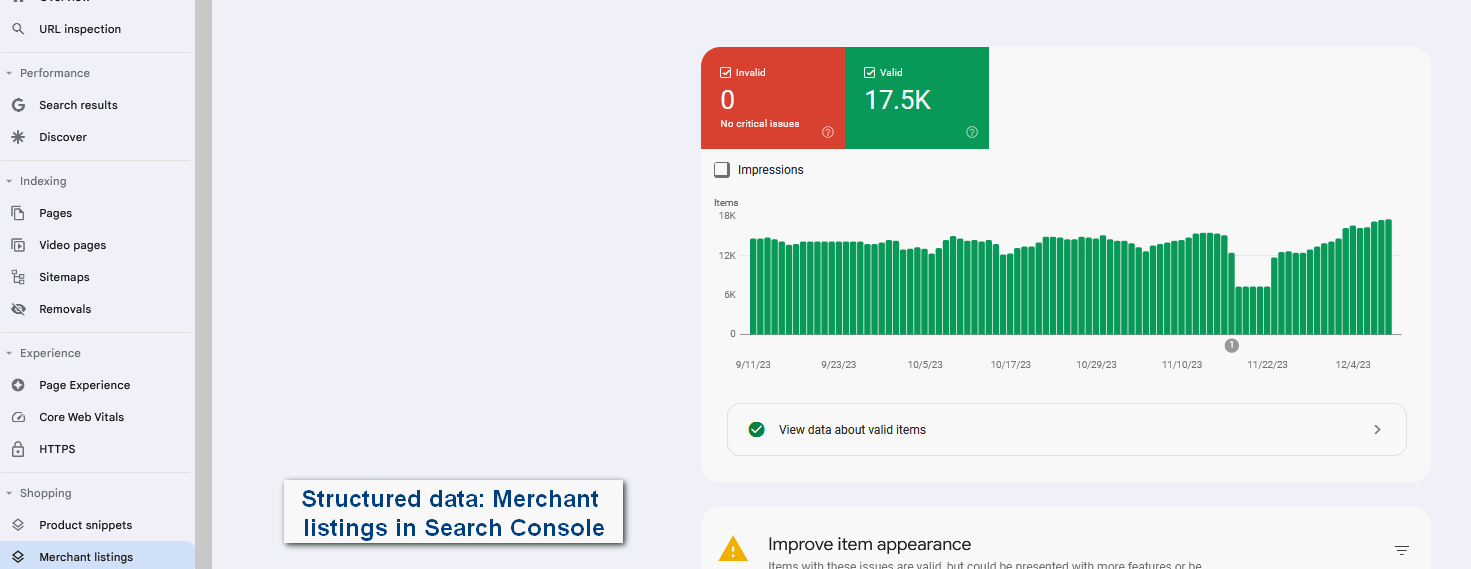
2. Google PageSpeed Insights
In the digital age, website speed goes beyond convenience; it's a critical factor in user engagement and SEO rankings. Google PageSpeed Insights is emerging as a critical tool in this arena, providing in-depth analysis of your site's performance across devices. When you enter your site's URL, the tool goes beyond a simple speed score to provide a detailed breakdown of your site's performance on both mobile and desktop platforms.
This tool evaluates multiple aspects of your site, such as time to interactive, how quickly content loads, and the overall stability of content as it loads. These metrics are critical components of Google's Core Web Vitals, a set of specific factors that Google considers important to the overall user experience of a web page. Core Web Vitals include metrics such as Largest Contentful Paint (LCP), First Input Delay (FID), and Cumulative Layout Shift (CLS), each of which represent different facets of the user experience: load performance, interactivity, and visual stability.
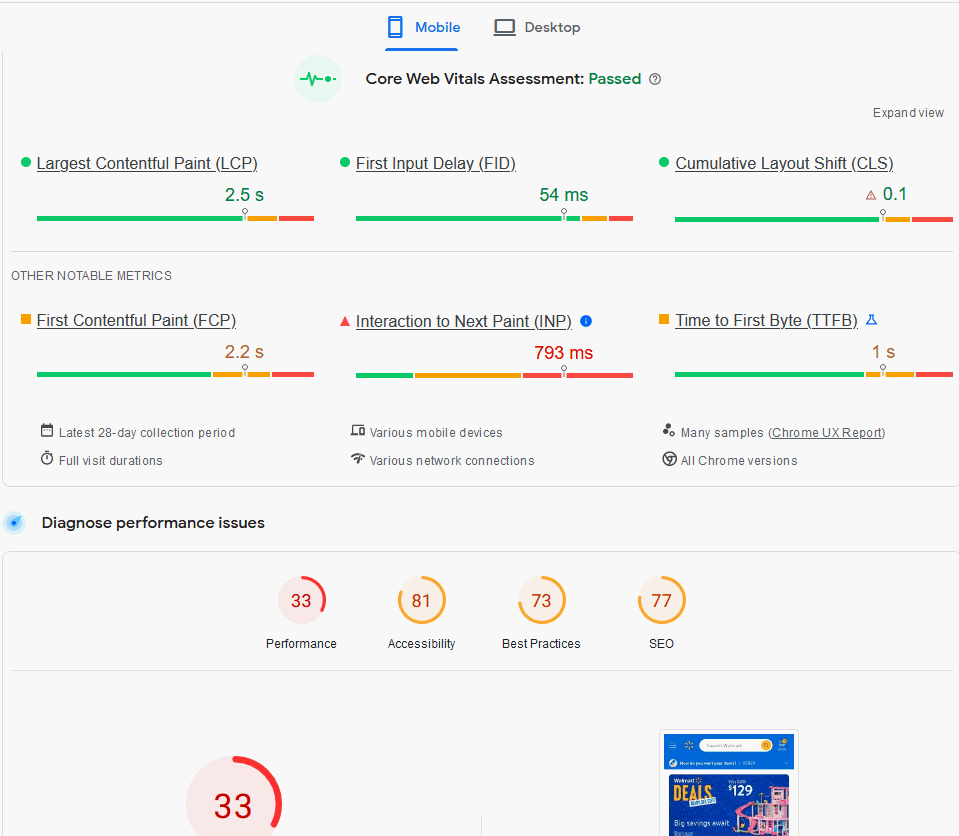
Each metric in Google PageSpeed Insights comes with a score that is categorized as good, needs improvement, or poor. This granular analysis helps you pinpoint areas where your site may be underperforming. In addition, Google PageSpeed Insights not only diagnoses performance issues, but also provides actionable recommendations for improvement. These suggestions could include optimizing images, reducing server response times, removing render-blocking resources, and taking advantage of browser caching. Implementing these changes can significantly improve your site's load speed and user experience, factors that are directly linked to higher search engine rankings.
In addition, Google PageSpeed Insights is aligned with the evolving landscape of web development and user experience design. It incorporates the latest best practices to ensure that your site is not only fast, but also efficient and responsive to user needs.
The inclusion of Core Web Vitals in Google PageSpeed Insights marks a significant shift in how website performance is evaluated. These vitals are now part of Google's ranking algorithm, underscoring the importance of a fast, efficient, and stable user experience. Sites optimized for these factors are likely to see improvements not only in user engagement, but also in their organic search rankings.
In summary, Google PageSpeed Insights is an essential tool for anyone looking to improve their online presence. In today's fast-paced digital world, a website that loads quickly and provides a seamless user experience is more than a convenience - it is a critical component of online success and visibility in search engine results.
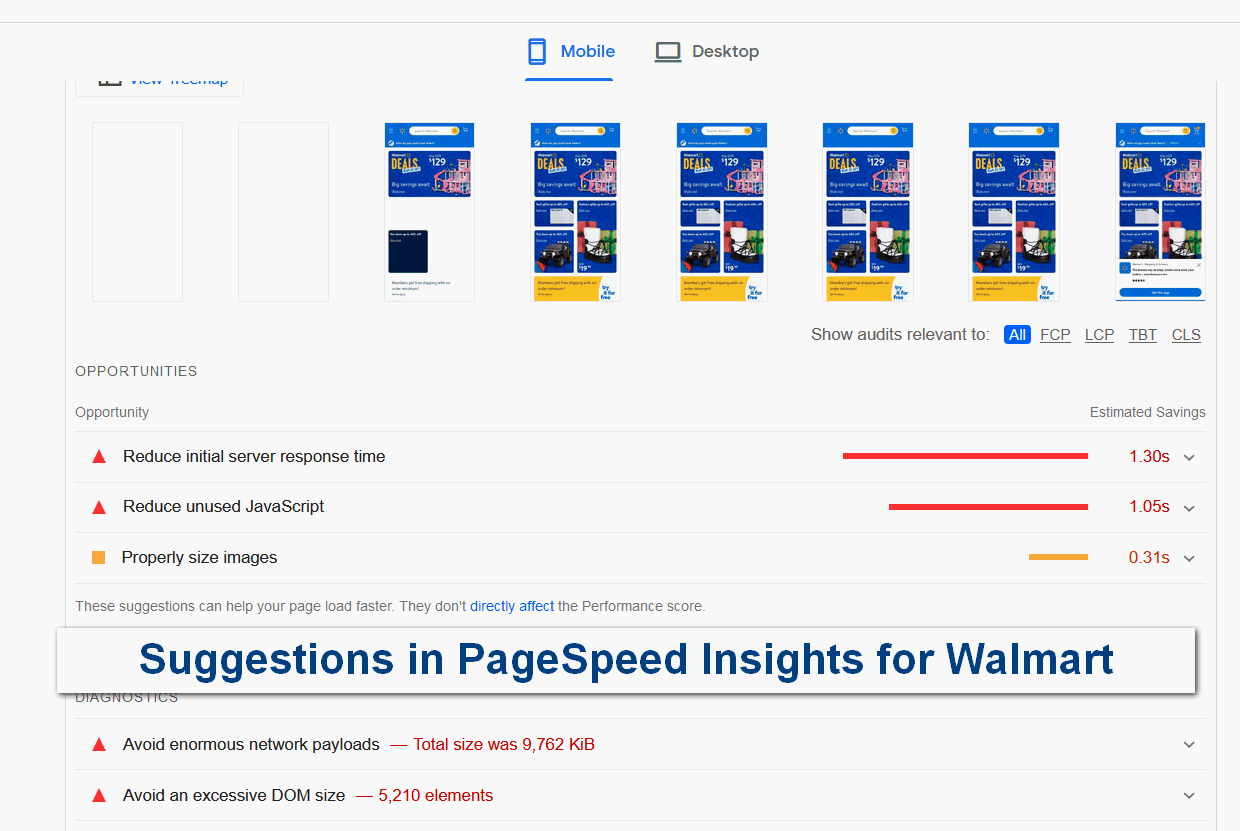
3. Ahrefs Webmaster Tools
Ahrefs Webmaster Tools (AWT) offers a powerful free version that provides a range of features for website owners and content creators to effectively optimize their websites. This tool serves as a valuable resource for those seeking comprehensive SEO insights without the commitment of a paid subscription. It also provides link data from the extensive Ahrefs database.

Free access to Site Audit and Site Explorer: The free version of AWT provides access to two of Ahrefs' core tools: Site Audit and Site Explorer. Site Audit is essential for webmasters who want to identify and fix technical SEO issues. It crawls all pages on a website and highlights issues such as broken links, missing alt tags, slow loading pages and more. This tool is critical to maintaining a healthy, search engine friendly website.
Site Explorer provides a detailed view of a website's backlink profile and organic search traffic. Users can explore which websites link to their site and evaluate the quality of those backlinks. Understanding the backlink profile is essential for SEO because it affects a website's authority and search engine rankings. The organic search report in Site Explorer helps users see which keywords their site ranks for, the estimated traffic those keywords bring, and the position changes in the SERPs.
Unlimited number of verified projects: The free version of AWT allows users to add an unlimited number of verified websites to their dashboard. This feature is especially beneficial for users who manage multiple websites, as it provides a centralized platform to monitor and analyze SEO performance across multiple sites.
Google Search Console Integration: AWT also provides the ability to verify website ownership through integration with Google Search Console (GSC). This feature allows users to easily connect their GSC data to AWT, enriching the SEO data available in Ahrefs tools. While Ahrefs may use anonymized and aggregated data to improve its models, individual site data remains confidential and is not shared with other AWT users.
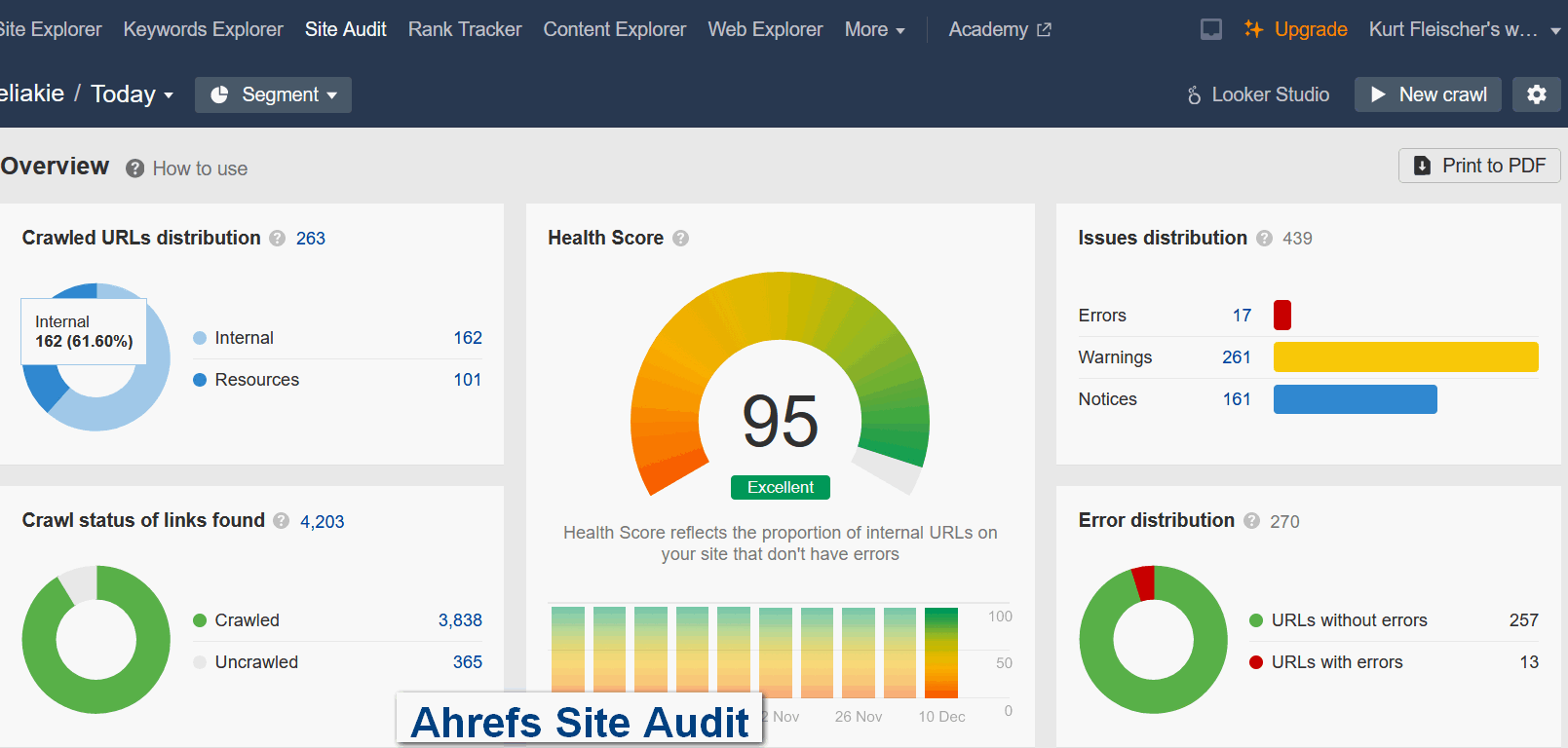
4. Google Analytics (GA4)
GA4 employs machine learning to provide deeper insights into user behavior, enabling businesses to understand not just what happens on their website but why it happens. This aspect of GA4 is crucial for developing more effective SEO and marketing strategies. The platform's predictive analytics capabilities help anticipate future trends and user actions, allowing for more proactive and targeted SEO approaches.
Another critical feature of GA4 is its improved event tracking, which automatically records interactions on a website. This feature eliminates the need for additional coding, making it more accessible and providing richer data for analysis. Understanding these user interactions is vital for refining SEO strategies to match user preferences and behaviors.
GA4 also addresses modern privacy concerns, offering a framework that respects user data while still providing valuable insights. This balance is particularly important in a landscape where data privacy regulations like GDPR and CCPA are becoming more prevalent.
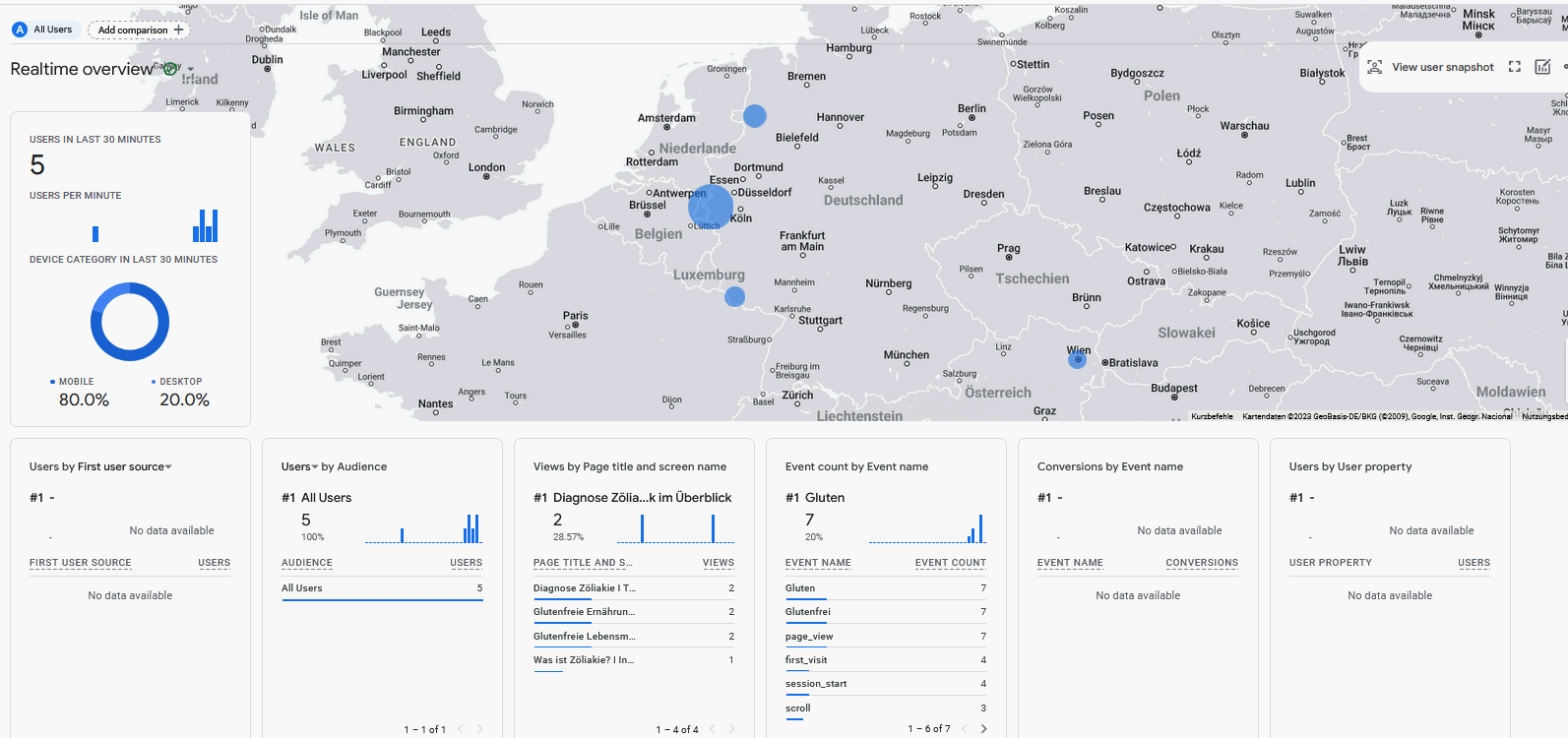
In summary, Google Analytics GA4 offers a more comprehensive and user-centric approach to web analytics. Its advanced features, such as machine learning and automatic event tracking, provide valuable insights for optimizing SEO and overall digital marketing strategies. This enhanced analytical power allows for a more granular understanding of customer journeys and touchpoints. Businesses can now track cross-platform sessions more seamlessly, offering a unified view of the customer experience. This is particularly beneficial for multi-channel marketing, where understanding the interconnectedness of different channels is key.
Furthermore, GA4's flexible and customizable reporting interface allows businesses to tailor their analytics to their specific needs. Whether it's tracking user engagement, conversion rates, or the effectiveness of marketing campaigns, GA4 provides the tools to create detailed, easy-to-understand reports. This customization is particularly useful for businesses that require specific data points to inform their strategy.
GA4's integration capabilities with other Google services, like Google Ads, enhance its utility for marketers. This integration enables more efficient ad targeting and retargeting, leading to better campaign performance and ROI. By leveraging the wealth of data available through GA4, marketers can refine their advertising strategies to reach the right audience at the right time.
Lastly, GA4's focus on user privacy and data protection should not be underestimated. In an era where users are increasingly aware of their data rights, GA4 provides businesses with the tools to collect and analyze data responsibly. This responsible approach to data analytics not only helps businesses comply with legal requirements but also builds trust with their audience.
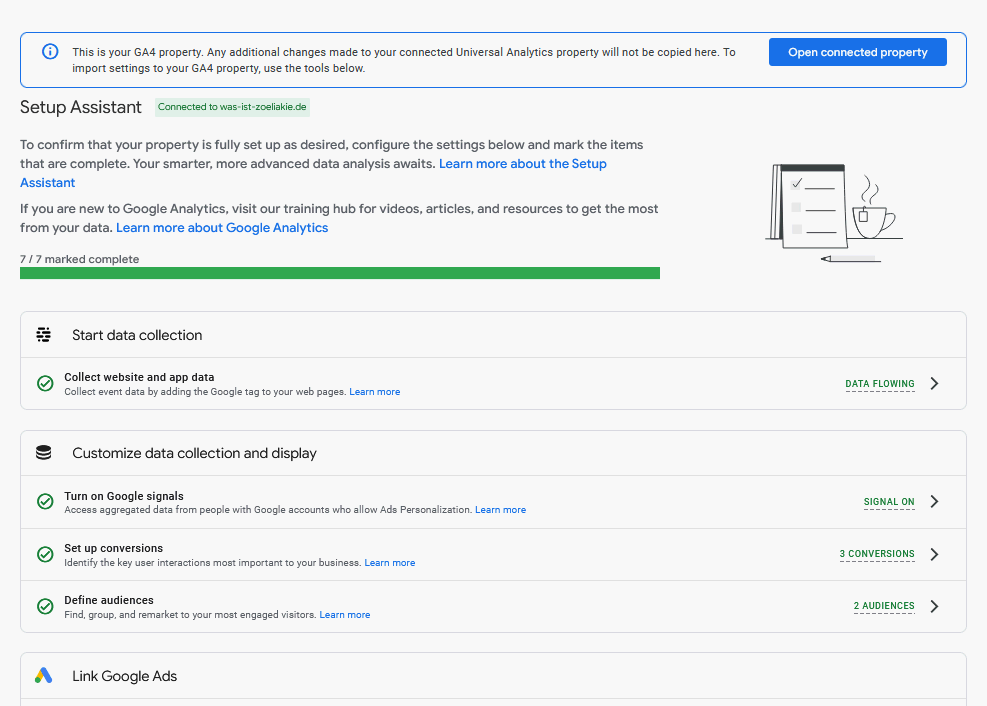
5. Copyscape
Oldie but goldie, Copyscape stands out as one of the few tools specializing in checking for external duplicate content. This unique capability is the reason it features prominently in this list. In the ever-evolving landscape of SEO and digital content creation, the importance of originality cannot be overstated. Copyscape provides an invaluable service in this regard, helping content creators and website owners ensure that their material is not only unique but also free from unintentional plagiarism.
Copyscape operates by scanning the web for instances where your content might have been copied or reproduced without permission. This functionality is crucial for maintaining the integrity of your website's content and protecting it from potential copyright infringement issues. In the SEO world, duplicate content can lead to penalties from search engines, making Copyscape an essential tool for those looking to optimize their web presence.
The platform offers both free and premium services. The free version allows users to enter a URL and instantly check if the content on that page is unique. For more in-depth analysis, the premium version provides a more comprehensive search, including the ability to check the originality of offline content by directly uploading it to the platform.
Copyscape's user-friendly interface and accurate results have made it a favorite among content creators, marketers, and SEO professionals. Its effectiveness in identifying exact matches and similar content across the internet helps users take timely action to protect their intellectual property. This could involve addressing potential copyright issues, rewriting content to enhance uniqueness, or identifying and addressing unauthorized use of their work.
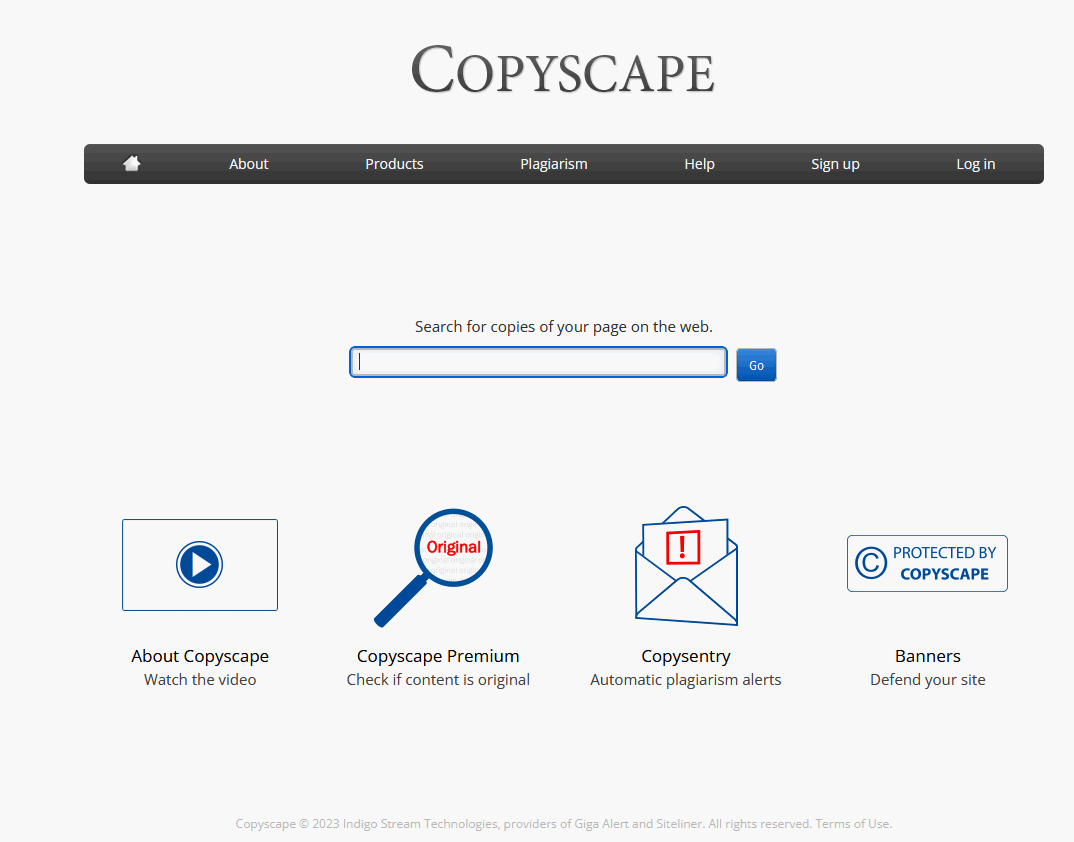
6. Ahrefs free keyword generator
Ahrefs' free keyword generator is an outstanding search engine optimization (SEO) tool that offers content creators and marketers the unique opportunity to conduct comprehensive keyword research for free. Unfortunately, there are very few free keyword research tools left on the market, so Ahrefs is our first choice.
Another provider is Wordstream, but their keyword research is limited to the USA.
The importance of keyword research in SEO:
Keyword research is the backbone of SEO. It involves identifying the terms and phrases that potential customers use in search engines. This insight is critical for creating content that matches user intent and improves website visibility in search engine results. Effective keyword research helps identify opportunities to attract targeted traffic, increase engagement, and improve a company's or individual's overall online presence.
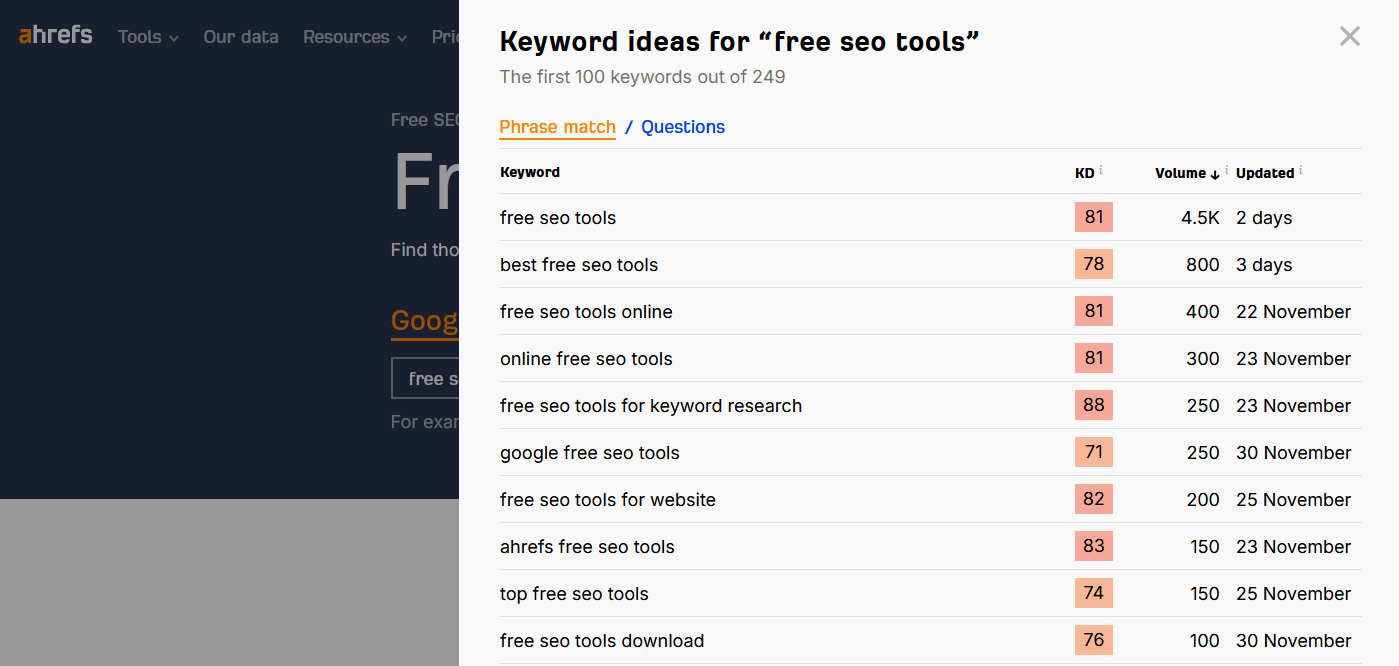
7. Seobility's Free SEO Software Suite
Seobility's suite of free SEO tools is designed to provide website owners and digital marketers with a quick and efficient means to conduct site checkups. This toolkit, available without the need for registration, includes several essential tools: SEO Checker, Keyword Checker, Ranking Checker, and the TF*IDF Tool. Each of these tools offers unique functionalities to assist in various aspects of SEO.
SEO Checker: The SEO Checker is a comprehensive tool for assessing the overall search engine optimization of a website. It evaluates key on-page factors such as title tags, meta descriptions, keyword usage, and alt tags. Additionally, it checks for technical SEO elements like site speed, mobile-friendliness, and internal linking structure. This tool is crucial for identifying fundamental SEO issues and providing actionable recommendations to enhance website visibility and ranking in search engine results pages (SERPs). 1.000 pages can be crawled
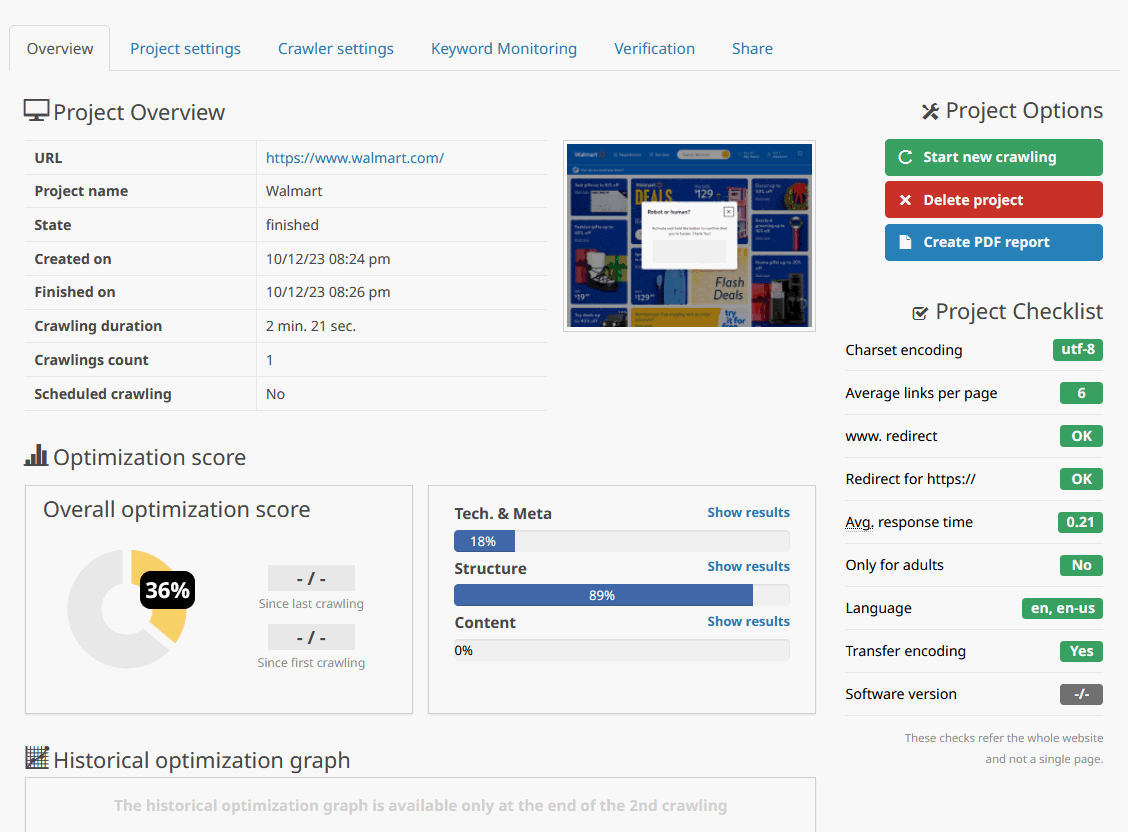
Keyword Checker: The Keyword Checker focuses on the on-page optimization for specific keywords. It helps users ensure that their content is appropriately optimized for targeted keywords, a critical factor in improving SERP rankings. This tool evaluates how well a webpage aligns with selected keywords, checking for their presence in vital locations such as headings, body text, and meta tags.
Ranking Checker: Seobility's Ranking Checker tool allows users to monitor their website's rankings for specific keywords across various search engines. It offers insights into the performance of keywords at both the global and local levels, including city-specific ranking data. This tool is particularly useful for tracking the effectiveness of SEO strategies over time and making necessary adjustments to improve rankings.
TF*IDF Tool: The TF*IDF (Term Frequency-Inverse Document Frequency) Tool is designed to enhance content relevance for specific topics or keywords. It analyzes the top-ranked content on Google and guides users in optimizing their pages for topical relevance. This tool is beneficial for content creators looking to ensure that their articles or blog posts are contextually aligned with what is currently performing well in SERPs.
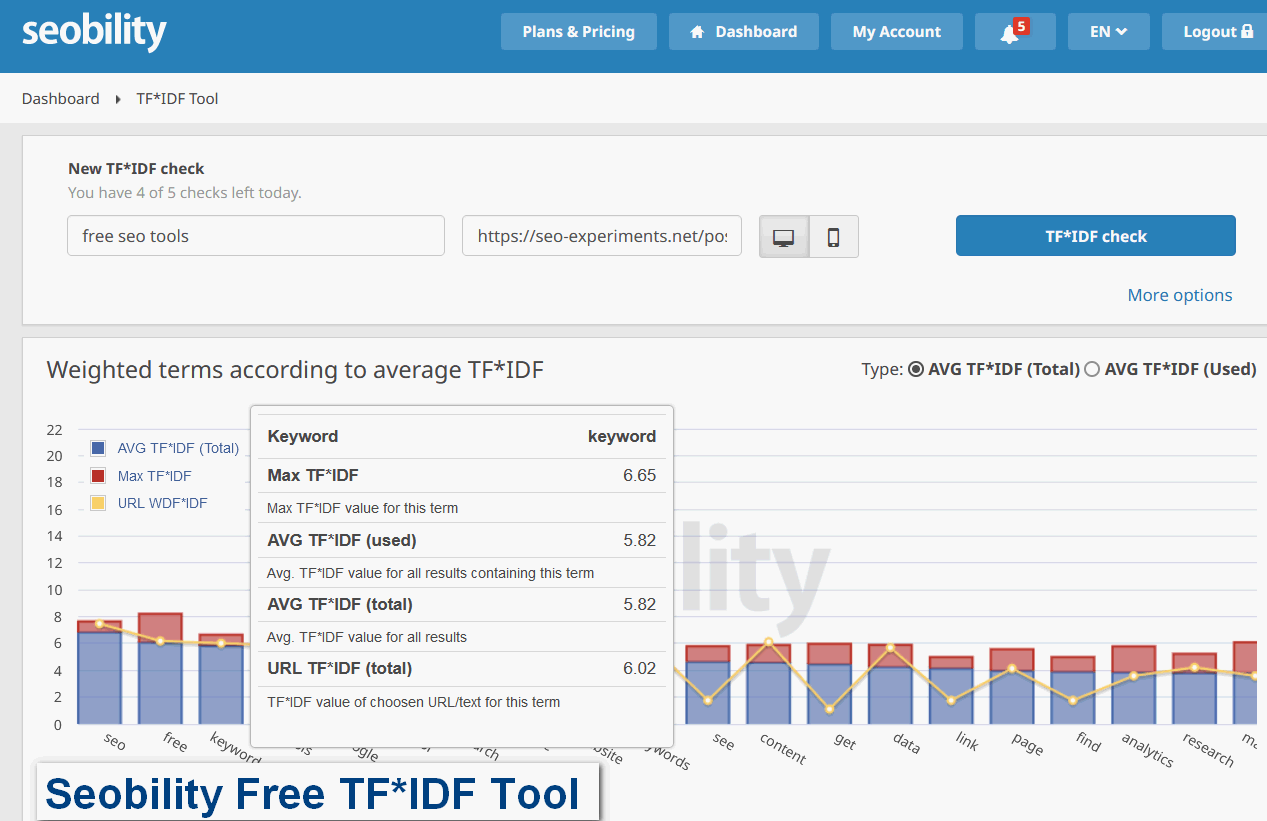
8. Semrush Free
Semrush, a renowned SEO analysis tool, offers a free version that provides an impressive array of features for digital marketers, SEO professionals, and website owners. This tool stands out for its combination of comprehensive capabilities and user-friendly interface, making it an excellent choice for those beginning their SEO journey as well as seasoned experts. Let’s delve into the key features and functionalities of Semrush’s free version.
Project and Dashboard Management:
Semrush’s free version allows users to create and manage a project or dashboard. This dashboard displays key evaluations and insights, providing an at-a-glance view of various SEO metrics. Within each project, users have access to 12 different SEO tools, covering various aspects of search engine optimization.
Keyword Research with Keyword Magic Tool:
The Keyword Magic Tool is a standout feature of Semrush, enabling users to generate keyword ideas by simply entering a search term. It comes with filter options to refine the search, and the resulting list includes details like search volume, trends, cost per click, and an assessment of keyword difficulty. This tool is particularly useful for identifying high-potential keywords and understanding the competitive landscape.
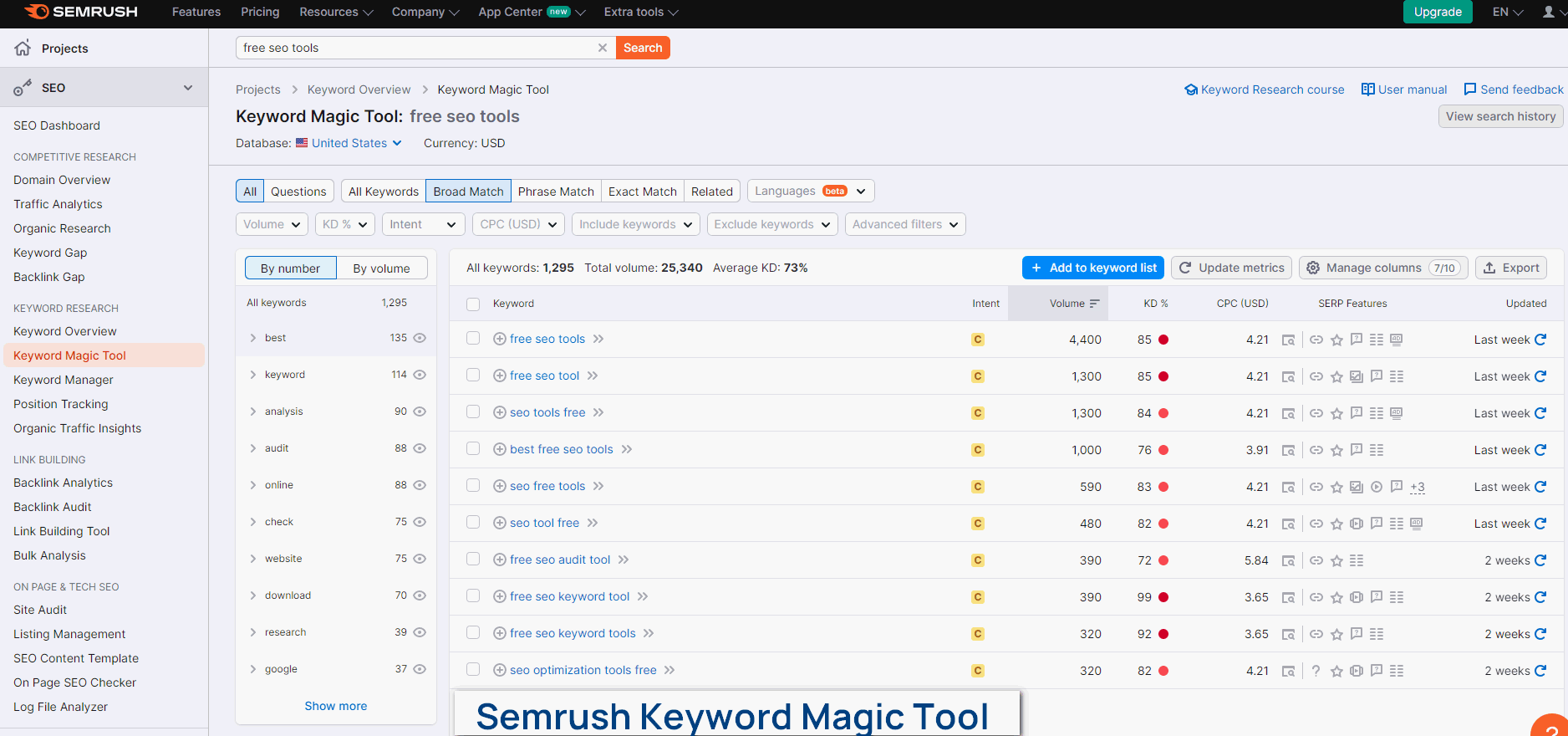
Position Tracking:
The Position Tracking tool allows users to input their domain, a list of competitors, and keywords to track daily rankings. This feature enables users to monitor their own domain’s keyword performance and compare it with competitors, offering valuable insights into ranking trends and strategic opportunities.
SEO Content Template Analysis:
Semrush’s SEO Content Template provides analysis of the top 10 Google results for a given keyword. It suggests related terms, potential backlinks, and gives recommendations on readability and appropriate text length. This tool is invaluable for creating content that is both SEO-friendly and competitive.
Onpage SEO Checker:
The Onpage SEO Checker lists specific content recommendations for on-page optimization. It provides actionable advice on how to improve various elements of a webpage to enhance its SEO effectiveness.
Site Audit and Health Score:
The Site Audit feature thoroughly checks a website and identifies any weak spots or issues. It provides a health score based on the audit, helping users pinpoint areas for improvement. In the free version, the number of pages that can be crawled is limited, but it still offers substantial value for small to medium-sized websites.
Competitive Analysis with SEO-Compare:
Semrush’s free version includes tools for competitive research, offering insights into the strengths and weaknesses of competitors. This feature is crucial for understanding the competitive landscape and developing strategies to outperform rivals.
Reporting Capabilities:
Users can create PDF reports with website audit results and competitive analysis in the free version. While the number of reports is limited, this feature is useful for tracking progress and sharing insights with team members or clients.
Educational Resources:
Semrush provides an extensive range of courses and educational materials, especially beneficial for beginners. These courses cover various topics, including keyword research, offering users the opportunity to enhance their SEO knowledge and skills.
Backlink tool:
The free version of Semrush's backlink tool is a valuable asset for SEO practitioners, offering insights into a website's backlink profile. It helps users track and analyze incoming links, assess link quality, and discover new link-building opportunities. This tool is essential for understanding and enhancing a site's authority and search engine ranking potential.
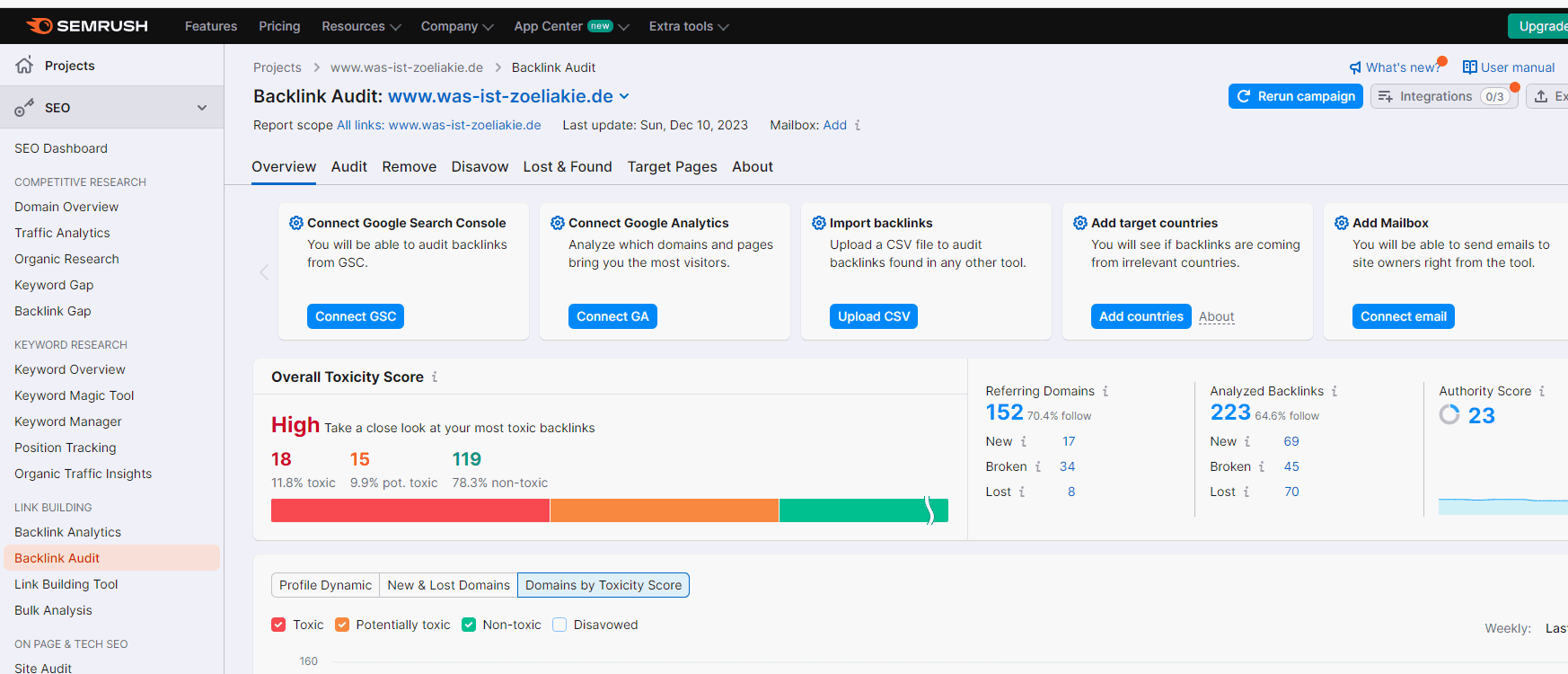
9. Rank Ranger's Free SEO Tools (Similarweb)
Rank Ranger has established itself as a prominent figure in the world of SEO, providing an array of free tools designed to aid SEOs at all levels of expertise. Some of the linked SEO tools are from Similarweb, which has acquired RankRanger.These tools, developed over the years, aim to drive success in optimizing sites for search engines, a crucial aspect of digital marketing today.
SERP Feature Tracker
The Desktop and Mobile SERP Feature Trackers are standout offerings from Rank Ranger. These tools provide valuable trends and insights on Google’s SERP features for both desktop and mobile platforms. Understanding these trends is essential for SEOs who wish to grasp the nuances of features like Featured Snippets, Direct Answers, Local Packs, and more. These insights can significantly influence SEO strategies by providing a deeper understanding of how Google's SERP features are evolving.
AMP on Google Tracker
With Google’s push towards a mobile-friendly web through the AMP Project, Rank Ranger’s AMP on Google Tracker is more relevant than ever. This tool shows the prevalence of AMP pages on the first page of Google SERPs, allowing users to track the growth or decline of AMP’s presence in search results. This is crucial for websites aiming to optimize their mobile presence and adhere to Google's standards for fast-loading pages.
Schema Markup Generator
Structured data is integral to modern SEO practices, and Rank Ranger’s Schema Markup Generator simplifies the process of creating JSON-LD markup. This tool, catering to users without extensive coding knowledge, facilitates the creation of schema markup, enhancing a site's ability to communicate effectively with search engines and improve its presence in search results.
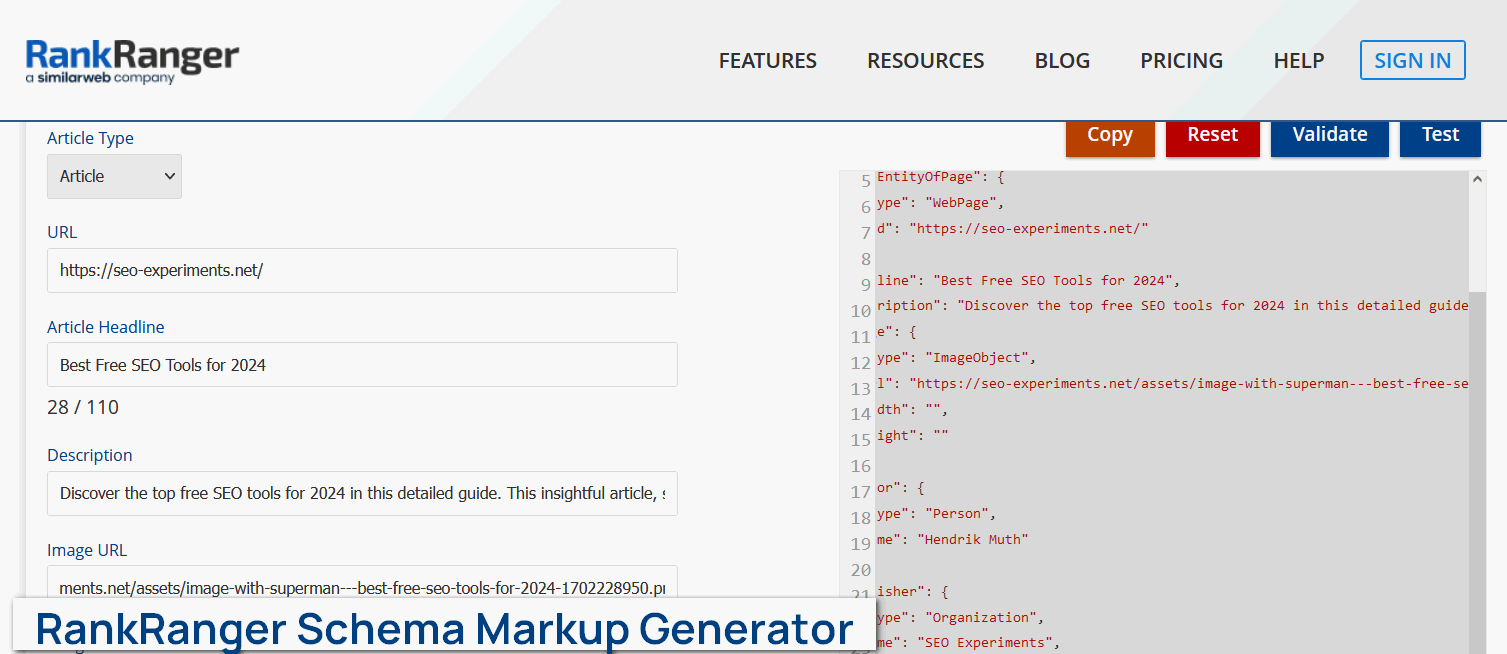
Top Websites by Organic Rank
Rank Ranger’s tool for discovering the web ranking of top sites offers a perspective on the organic traffic and traffic cost of these sites. This functionality is invaluable for benchmarking and understanding the SEO performance of leading websites, as well as comparing your site's performance against industry leaders.
SERPulator for Meta Tags
The SERPulator is a practical tool for crafting meta titles and descriptions, ensuring they are optimized and not truncated in search results. This tool is fundamental for implementing best SEO practices, allowing users to preview how their metadata will appear in SERPs.
Rank Risk Index
With Google’s frequent algorithm updates, the Rank Risk Index is a vital tool for tracking rank volatility. This tool helps indicate the rollout of Google updates and their impact on SERP rankings, a key factor for SEOs to monitor and adapt their strategies accordingly.
Site Explorer
The Site Explorer provides insights into a competitor’s organic and paid keywords and identifies content overlap with competitors. This tool forms the foundation for competitive analysis, helping to gauge the competitive threat faced by any site.
Keyword Finder
Rank Ranger’s Keyword Finder is a gateway to effective keyword research. It offers an initial overview of relevant keywords and topics, aiding in the development of SEO strategies. The tool's filters enable refined research, providing a broader understanding of the potential of a topic or keyword.
UTM Code Builder
The UTM Code Builder simplifies the creation of custom URLs for tracking the effectiveness of marketing campaigns. This tool is particularly useful for monitoring traffic from various sources, especially for social media.
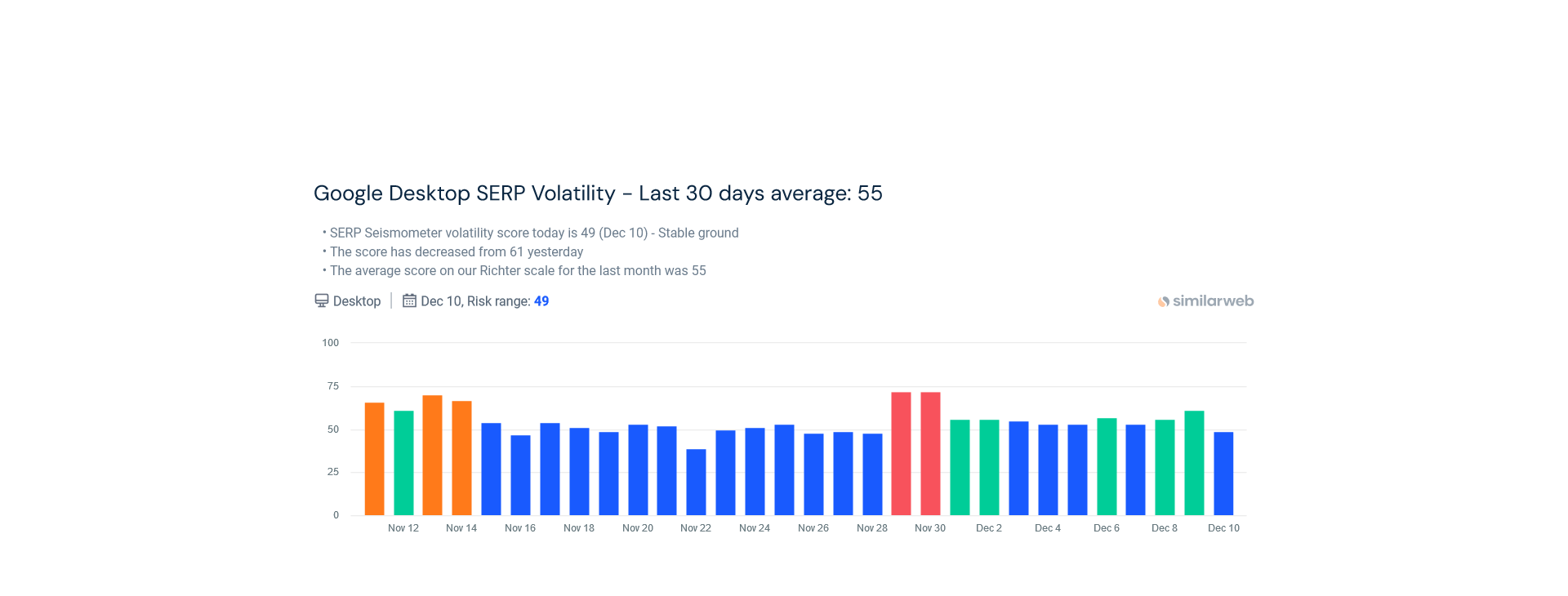
10. Screaming Frog SEO Spider
Screaming Frog SEO Spider is a highly acclaimed website crawler, widely regarded as an industry leader for technical SEO site audits. Its versatility makes it a favorite among SEO professionals and agencies for its ability to conduct in-depth analysis of websites of varying sizes efficiently. Here, we will explore the features and capabilities of the free version of Screaming Frog SEO Spider, which is a fundamental tool for anyone looking to enhance their website's SEO.
Key Features of the Free Version:
Crawling Capabilities:
The free version of Screaming Frog allows users to crawl up to 500 URLs per website. This feature is powerful enough to provide comprehensive insights for small to medium-sized websites, making it an ideal tool for initial audits and quick checks.

Find Broken Links and Errors:
The tool swiftly identifies broken links (404s), server errors, and redirects within a website. This feature is essential for maintaining a healthy website by ensuring all links lead to the correct pages and that there are no dead ends that could frustrate users or harm search engine rankings.
Audit Redirects:
Screaming Frog effectively finds and analyzes temporary and permanent redirects. It can identify redirect chains and loops, crucial for website migrations or ensuring that URL redirections are correctly implemented.
Analyse Page Titles & Meta Data:
It checks page titles and meta descriptions, identifying issues like duplicates, missing, too long, or too short tags. This feature is vital for optimizing pages for search engines and improving click-through rates from SERPs.
Discover Duplicate Content:
The tool uses an advanced algorithm to find exact duplicate URLs and partially duplicated elements like titles and descriptions. This feature is crucial in avoiding content duplication issues, which can negatively impact SEO.
Review Robots & Directives:
Users can view URLs blocked by robots.txt, meta robots, or X-Robots-Tag directives. This feature is important for ensuring that search engines are crawling and indexing the correct pages.
Generate XML Sitemaps:
The tool allows for quick creation of XML Sitemaps, providing control over URLs to include and settings for last modified, priority, and change frequency.9. Integrate with Google Analytics, Search Console, & PSI: While some advanced features are limited, the free version offers integration options that provide additional insights into user behavior and performance metrics.
Crawl JavaScript Websites:
The SEO Spider can render web pages using the integrated Chromium WRS, allowing it to crawl dynamic, JavaScript-rich websites effectively.
Visualize Site Architecture:
Users can evaluate internal linking and URL structure using interactive site visualizations. This feature is invaluable for understanding and improving website navigation and information hierarchy.
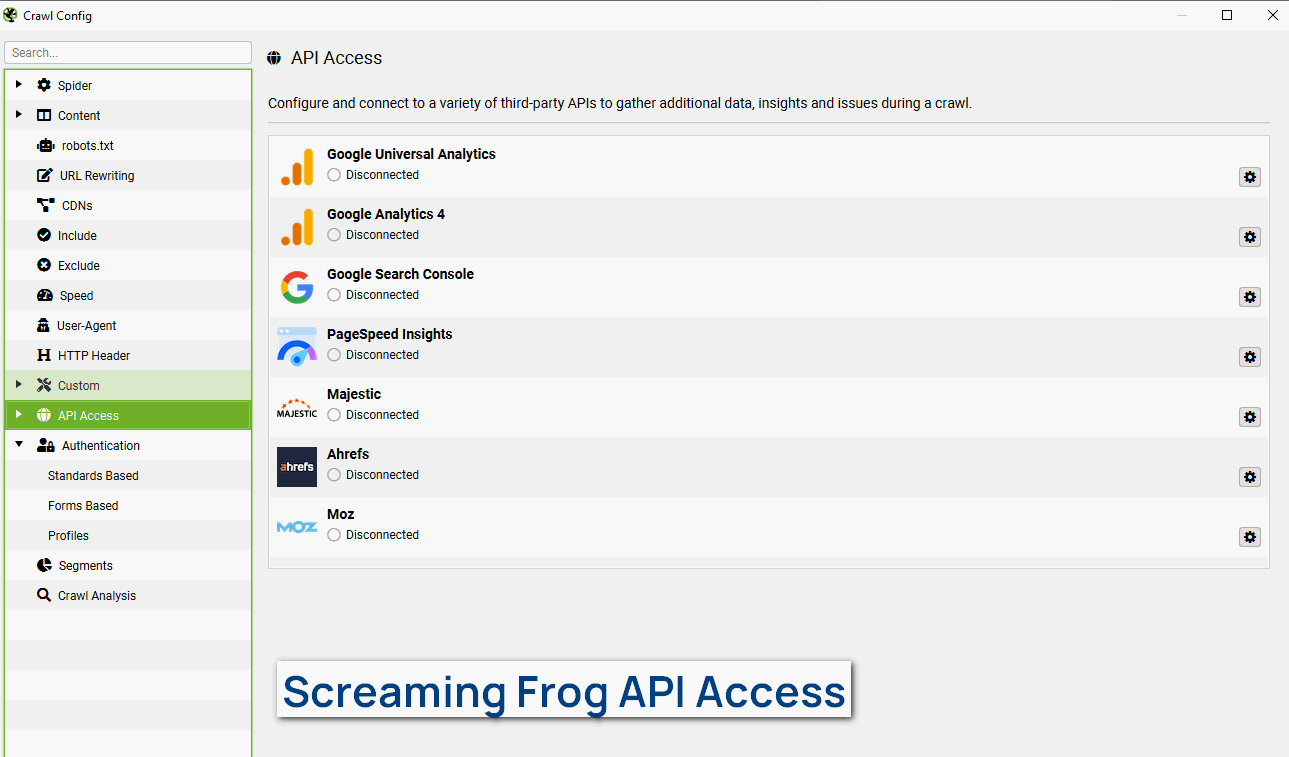
11. RankTank
RankTank offers a Google Sheet addon that I often use when I need additional data. This tool stands out for its ability to provide live, real-time data on keyword rankings, a feature that is particularly useful when you need organized lists of keyword positions for in-depth analysis. In this article, we will explore the features and benefits of RankTank's free version, focusing on its ability to track up to 1,000 keywords per month, a quota that is updated every month.
Understanding RankTank's Free Keyword Positioning Tool:
Real-time data analysis:
RankTank's tool is designed to provide live data, giving users the most up-to-date information on keyword rankings. This feature is invaluable for SEO professionals and website owners who need to make timely decisions based on the latest Search Engine Results Page (SERP) rankings.
Keyword tracking capabilities:
Users can track up to 1,000 keywords per month, a generous offering for a free tool. This capacity makes RankTank an ideal solution for small to medium sized businesses or individuals looking to monitor their SEO performance without incurring additional costs.
Monthly quota update:
The keyword tracking quota is updated every month, ensuring that users have consistent access to keyword tracking capabilities. This feature is especially beneficial for ongoing SEO campaigns and long-term strategy planning.
User-friendly interface:
RankTank's tool is designed with simplicity in mind, allowing even those new to SEO to easily enter keywords and domains to receive instant ranking data.
Integration with Google Sheets:
The tool seamlessly integrates with Google Sheets, allowing users to efficiently store and manage their historical data. This integration makes it easy to track keyword ranking progress over time.
Mobile and Desktop User Agents:
The tool provides data for both desktop and mobile user agents, reflecting the growing importance of mobile optimization in SEO strategies.
SEMrush API support:
RankTank's free tool includes support for the SEMrush API, allowing users to pull in additional data such as Monthly Search Volume (MSV), further enriching the keyword analysis experience.
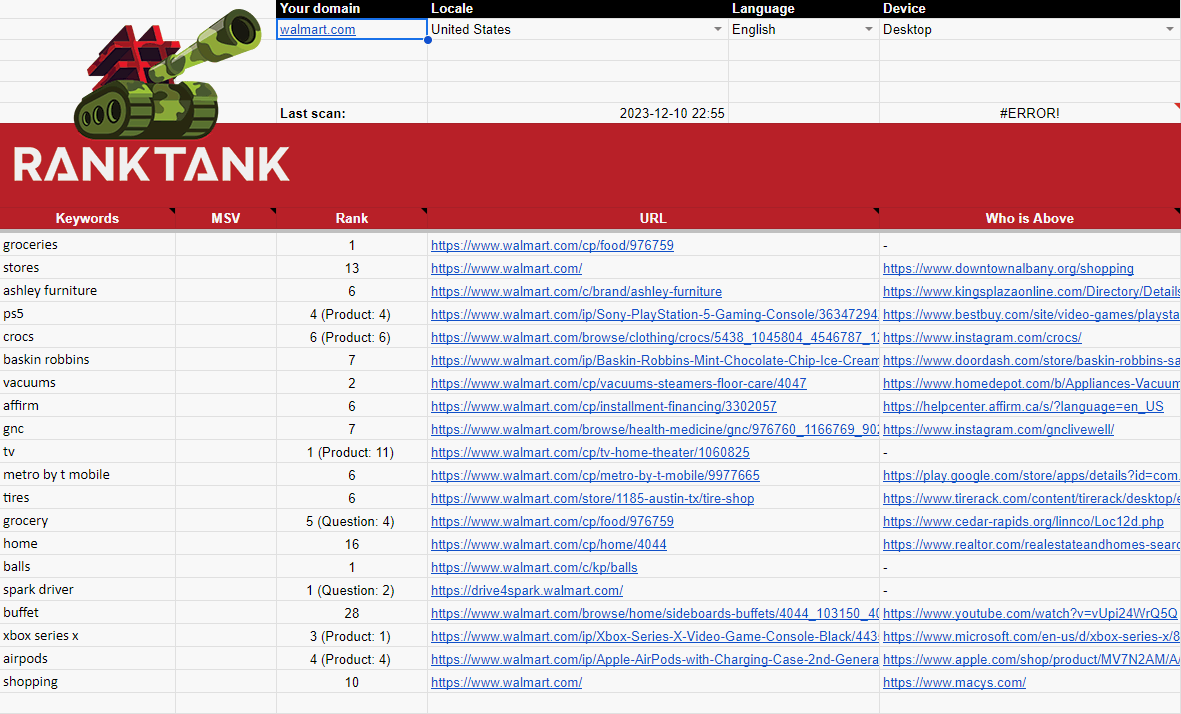
12. ChatGPT
In the rapidly changing landscape of Search Engine Optimization (SEO), incorporating advanced AI technologies like ChatGPT is becoming increasingly beneficial. Developed by OpenAI, ChatGPT is more than just a conversational AI; its potential in SEO is substantial, providing innovative solutions and support to marketers, content creators, and SEO professionals. Below, we explore why ChatGPT is gaining traction as a valuable tool in SEO, with a special focus on its diverse applications, including its automation capabilities.
Content Generation and Ideation:
ChatGPT excels in generating high-quality, SEO-friendly content. It can swiftly propose ideas for blog posts, articles, and web content that align with specific keywords or topics, significantly enhancing content creation efficiency and search engine optimization.
Keyword Research and Optimization:
In SEO, targeted keyword integration is key. ChatGPT aids in this by suggesting relevant keywords and phrases. It can also optimize existing content by advising on the strategic placement of these keywords to maximize SEO impact.
Meta Descriptions and Title Tags:
The AI can creatively craft meta descriptions and title tags that are not only engaging to users but also include pertinent keywords, boosting click-through rates and SERP rankings.
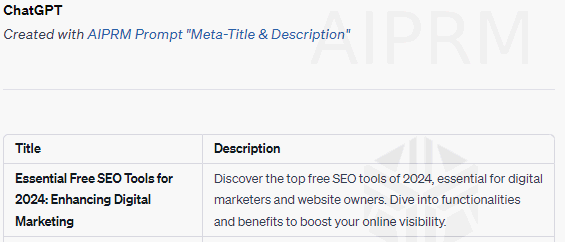
Handling Complex Queries:
ChatGPT's ability to process and respond to intricate queries can be leveraged in creating detailed FAQ sections, enhancing a website's authority and relevance in its niche.
Local SEO Enhancements:
For location-based businesses, ChatGPT can generate localized content and responses, which is crucial for improving visibility in local search results.
Content Analysis and SEO Recommendations:
The AI can review existing content for SEO effectiveness, suggesting enhancements and identifying areas lacking optimization, valuable for content audits.
Strategizing SEO Efforts:
ChatGPT offers insights into current SEO trends and techniques, including link-building strategies and technical SEO aspects like site architecture and schema implementation.
Scripting for Automation: Perhaps one of ChatGPT's most significant advantages in SEO is its ability to create scripts for automating various SEO tasks. This includes automating reports, alerts for SEO metrics, tracking keyword rankings, and even automating content updates. Automation scripts can save time, reduce human error, and ensure continuous SEO monitoring and improvements.
ChatGPT Creates and Corrects Structured Data:
ChatGPT is not just a tool for content creation and conversation. Its utility extends to the technical side of SEO, specifically in the creation and correction of structured data. By leveraging ChatGPT, webmasters and SEO professionals can ensure their webpages communicate more effectively with search engines, leading to better indexing and potentially higher search rankings.
Continual Learning and SEO Updates: ChatGPT serves as an educational tool in the ever-evolving field of SEO. It provides up-to-date information on SEO best practices, algorithm changes, and new trends, keeping SEO practitioners at the forefront of the industry.
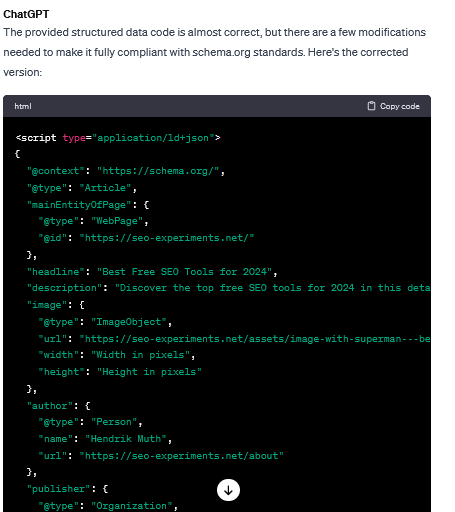
Additional Free SEO Tools
A vital tool for content marketing, offering a collection of key questions and phrases around any keyword. It features a range of long-tail keywords, including all types of 'W' questions, combinations with articles and prepositions, and comparisons (such as 'versus', 'and', 'or').
While Bing may not have as many search queries as Google, the Bing Webmaster Tools are worth exploring. They include tools for keyword research, structured data markup checking, and an SEO analyzer (Beta) to verify if a URL meets SEO best practices. Importantly, you can also determine if a page has been hacked. Users with a connected Google Search Console account can import their verified websites with a single click.
This tool helps quickly retrieve the most important meta-tags and SEO-relevant aspects of a website, such as title tags, meta descriptions, viewport settings, canonical tags, H-headings, and internal and external links.
Still accessible with a Google account, this tool offers rough search volume estimates, making it a valuable resource for keyword research.
Tests the performance of AMP (Accelerated Mobile Pages) pages, which are designed for faster mobile browsing.
Checks if a page is optimized for mobile devices and offers relevant optimization tips.
Quickly and easily tests your website's structured data, with a preview option for individual elements (Rich Snippets). Structured data plays a vital role in modern SEO.
Google Trends reveals trending search queries over different periods, aiding in the discovery of seasonal fluctuations in search interest. By comparing various terms, you can observe their comparative popularity across time.
Another tool for PageSpeed optimization, breaking down loading time recommendations into two scores (YSLOW and PageSpeed) by content type. A limitation is that the server operates from Canada,
In its free version, it doesn't show exact search volumes but ranks the most searched terms for various search engines and platforms, including Google, YouTube, Bing, Amazon, eBay, Instagram, and Twitter.
Offers the ability to test and optimize a website's loading speed. Users can choose the server location, including options like Frankfurt.
Ryte offers a suite of free SEO tools designed to enhance website optimization for webmasters. These tools include a Structured Data Helper, Topic Explorer, Website Checker, robots.txt Generator, Text Uniqueness Tool, Google Snippet Optimizer, and a specialized Robots.txt Tool, each providing unique functionalities to improve various aspects of website performance and search engine visibility.
A collection of SEO tools installed locally on your computer. The free version offers numerous functions, and registration is required. It serves as a good desktop complement to other SEO tools.
Easily creates clean hreflang tags recommended for multilingual and cross-border websites.
A good on-page analysis tool for beginners, available in the free version of the Sistrix Toolbox.
Sistrix Visibility Index Check
Allows free calculation of the renowned Sistrix Visibility Index, one of the most respected metrics in the SEO field.
Checks if a website's HTTPS certificate is functioning correctly, crucial for better rankings.
A compression tool for JPG and PNG images, with hardly any noticeable difference between compressed and uncompressed images.
Checks if your HTML, XHTML, etc., are valid according to W3C web standards. There's also a CSS Validation Service available from W3C.
In addition to the Xovi Visibility Index (OVI), this tool provides many other useful metrics for a domain.
Conclusion
To be successful in SEO, it is essential to know the current status of your website and its potential. The free SEO tools listed above cover most of the critical areas of search engine optimization. The SEO landscape is complex and constantly evolving, making the use of effective tools a necessity for anyone looking to improve their website's search engine performance. While the array of free tools discussed provide a solid foundation for various SEO tasks, they represent just the tip of the iceberg in the vast world of search engine optimization.
Successful SEO strategies rely on a balanced mix of free and paid tools. Free tools are a great starting point and can provide significant value, especially for small businesses or individuals just beginning their SEO journey. However, as SEO goals become more complex and competitive, the need for paid tools grows. By leveraging the strengths of both free and premium tools, you can develop a more robust and effective SEO strategy that drives results and increases online visibility.



